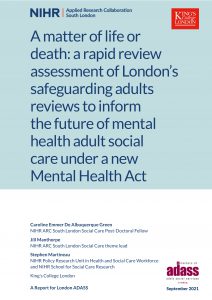 Caroline Emmer De Albuquerque Green, NIHR ARC South London Post-Doctoral Fellow at the NIHR Policy Research Unit in Health and Social Care Workforce, introduces a new report on what Safeguarding Adults Reviews tell us about mental health social care services for adults in London. The report was co-authored with Unit Director Prof Jill Manthorpe and Research Fellow Stephen Martineau. (500 words)
Caroline Emmer De Albuquerque Green, NIHR ARC South London Post-Doctoral Fellow at the NIHR Policy Research Unit in Health and Social Care Workforce, introduces a new report on what Safeguarding Adults Reviews tell us about mental health social care services for adults in London. The report was co-authored with Unit Director Prof Jill Manthorpe and Research Fellow Stephen Martineau. (500 words)
Safeguarding Adult Reviews show that social care can be a matter of life or death when it comes to people experiencing mental health problems. In this new report we focus on a sample of Reviews that bear witness to the sad cases of people who may have been needing or using social care services to support them with mental health problems but who died or had been harmed and where multi-agency working was explored by the Review process. As with all such Reviews, they are designed to help learning and so improve individuals’ care and systems.
 Our report ‘A matter of life or death: A rapid review assessment of London’s safeguarding adults reviews to inform the future of mental health adult social care under a new Mental Health Act’ was commissioned by LondonADASS (Association of Directors of Adult Social Services). We amplified the learning from Safeguarding Adult Reviews published across all London Councils between 2017 and 2020 and also consulted Coroners’ Reports to Prevent Future Deaths. Our analysis is being used by LondonADASS to inform debates about the proposed new Mental Health Act, where, curiously safeguarding appears to be overlooked.
Our report ‘A matter of life or death: A rapid review assessment of London’s safeguarding adults reviews to inform the future of mental health adult social care under a new Mental Health Act’ was commissioned by LondonADASS (Association of Directors of Adult Social Services). We amplified the learning from Safeguarding Adult Reviews published across all London Councils between 2017 and 2020 and also consulted Coroners’ Reports to Prevent Future Deaths. Our analysis is being used by LondonADASS to inform debates about the proposed new Mental Health Act, where, curiously safeguarding appears to be overlooked.
Our research suggests that there are specific groups of people who require particular attention when it comes to improving adult social care for people with mental health problems. There are also two major problem areas: first, professional knowledge and use of the Mental Capacity Act 2005 and second, inter-agency working and communication. These are really important now but also give some ideas for people working on training and implementation of mental health and mental capacity law and practice. We recommend other areas where local councils and other groups could be creative in taking forward professional practice. These include more attention to knowing the risks of pressure ulcers, looking at Coroners’ recommendations that are sent to mental health services, generally in the NHS, and taking the opportunity to discuss good practice as well as learning from when things did not go well. We also make suggestions for the authors and commissioners of Safeguarding Adult Reviews around collecting better information and keeping an eye on the implementation of recommendations.
Elaine Allegretti, Director of People & Resilience, London Borough of Barking and Dagenham, who is LondonADASS’ Mental Health lead provided the foreword to our report. She said: ‘This report is the first of its kind to use these two data sources together to identify recommendations to improve the wellbeing of those with mental health problems in London and to highlight that safeguarding must be part of social care support for people experiencing poor mental health. Any new mental health law must include safeguarding of the rights of people with mental health problems from neglect, abuse and exploitation’. We will be working with LondonADASS to track the response to our recommendations. This study is part of our programme of research that is responding to the priorities in South London through strong collaboration with local councils, providers, practitioners and people using social care services and carers (the NIHR Applied Research Collaboration).
Caroline Emmer De Albuquerque Green is NIHR ARC South London Post-Doctoral Fellow at the NIHR Policy Research Unit in Health and Social Care Workforce.
Emmer De Albuquerque Green, C, Manthorpe, J & Martineau, S (2021) A matter of life or death: a rapid review assessment of London’s safeguarding adults reviews to inform the future of mental health adult social care under a new Mental Health Act. NIHR Applied Research Collaboration South London; NIHR Policy Research Unit in Health and Social Care Workforce, The Policy Institute, King’s College London, London.